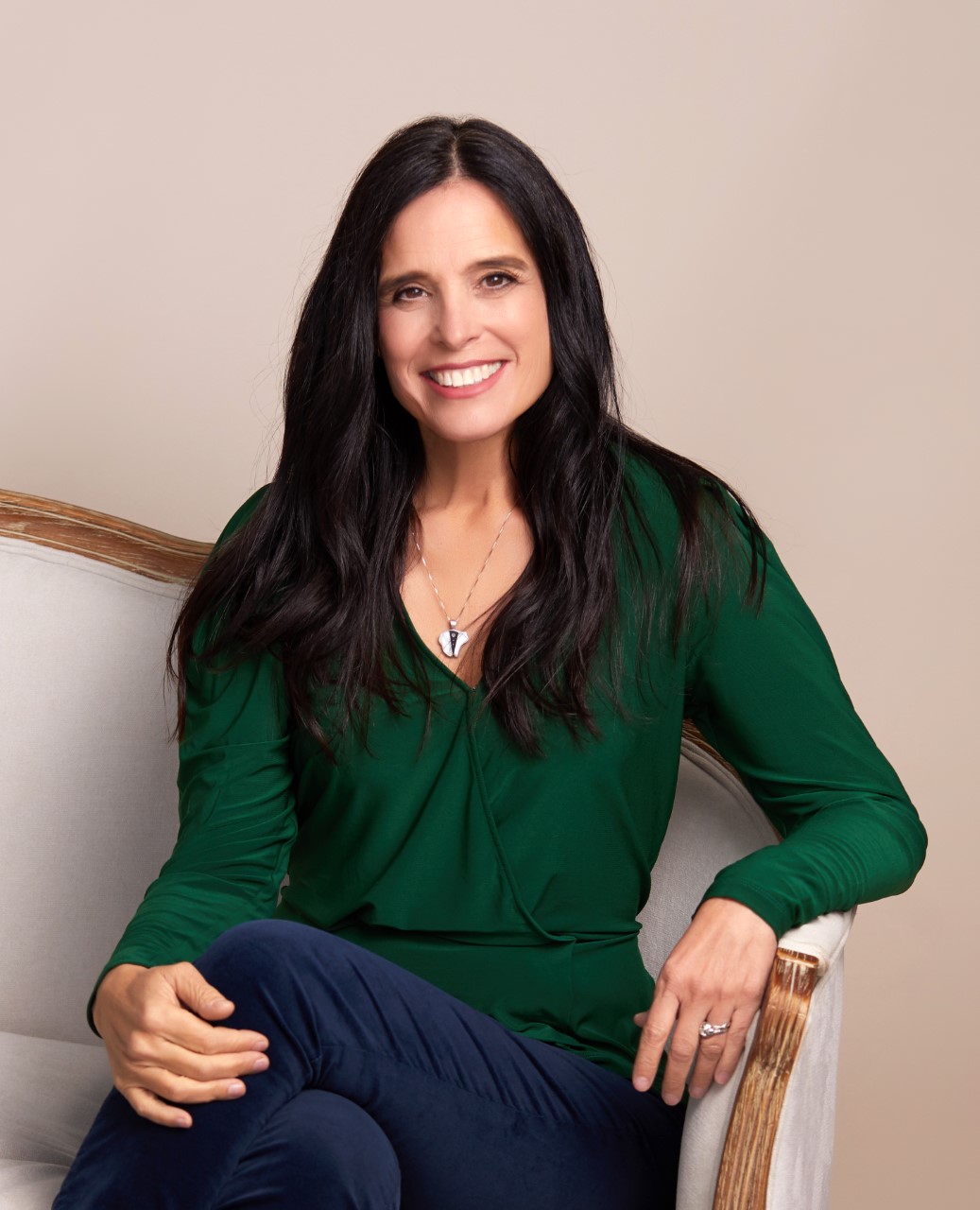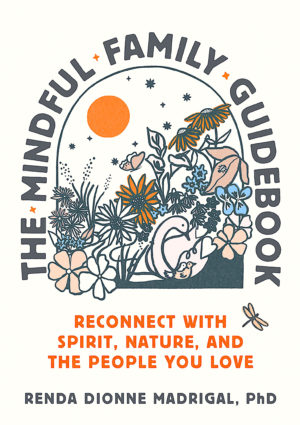
I was excited to chat with clinical psychologist and UCLA-certified mindfulness facilitator Renda Dionne Madrigal. Below she shares some of her favorite mindful family activities, her inspiration for writing, and the impact creating a mindful family unit can have on parents and children.
Renda Dionne Madrigal,PhD is author of the book The Mindful Family Guidebook: Reconnect with Spirit, Nature, and the People You Love. Drawing on indigenous circle practice for communication, it offers over 80 fun and profound activities and lessons on how to cultivate and grow authentic connections in your family.
What inspired you to write this important book?
Dr. Renda Dionne Madrigal: It really started when I was just beginning my walk as a psychologist on Indian reservations. Native communities love and focus on children to an incredible degree. I learned early on that to help children, it is important to help parents. We all, adults and children alike, need healthy families to live our best lives. I saw mindfulness retreats and trainings that focus on adults or on children, but rarely families together. When I learned about mindfulness with Thay, [Thich Nhat Hanh], it was wonderful that the retreats were for the whole family. I was inspired to write this book for my own family and the families I work with, so they could share medicines that help them calm, connect, and support each other in a way that helps all discover and realize their true path individually and collectively.
Can you discuss the impact and importance of creating a mindful family unit to children and parents?
Dr. Renda Dionne Madrigal: Joining together as a mindful family is a profound act; it’s one of the most important things you will do in your lifetime, and its reach is vast. It touches both the past and the future. We don’t exist separately from our ancestors. We come from a history that reaches far into the past. If we have children, we cast a line leading far into the future. The past and the future are connected, and whether this connection manifests in positive or negative ways is determined in the present. That’s why having a North Star to guide you is so important.
The North Star shines with the luminosity of 2,500 suns. It has guided our ancestors in the Northern Hemisphere for centuries. We need something that is illuminating to find our way with our families. This North Star can’t be from a mass-produced mold. It has to be handmade, crafted from star dust originating in our own lineage. To craft this kind of North Star we need our intuition and our history. So much of who we are has been clouded over, obscured, forgotten. Mindfulness is a practice of remembering. It is a practice that can help us get in touch with that deep instinctual knowing that’s needed to create the life and family that will truly nourish and sustain us all.
What are your favorite mindful family activities?
Hands down, it’s gotta be storytelling. With that said, mindful family activities build on each other. Three pillars form the foundation: digging deep to find ancestral strength and connections which can be brought forward; weaving a circle of respect together; and cultivating shared joy.
It’s exciting to teach families about the importance of the North Star through the profound wisdom embedded within a Paiute Indigenous story, and then witness them reaching into their past and discovering their own ancestral strengths, which they craft into stories to transmit to their children. This all happens in a story circle. In preparation for a story circle, families create a circle of respect through improvised games in which they build a respectful ensemble. For this activity, they also craft a talking stick and learn a North Star breathing practice.I really love the practices of cultivating joy, which bring out or expand the magic of the fun love that families share together. In one improvised activity, families create joy together through passing a ball around and sharing memories. In another mindfulness activity they practice sending kind wishes to one another. In an appreciative joy practice, they envision each other’s good fortune expanding. This is a crucial practice to cultivate in a society where the emphasis is on competition and one person’s gain is seen as another person’s loss. In a mindful family, success is shared and encouraged. All of these practices work together to create a family environment in which the individual and the group can thrive.
What was the hardest part of the book to write?
Dr. Renda Dionne Madrigal: This book is really about a journey. One of the hardest parts of the book to write had to do with laying out the landscape of that journey — defining and weaving together weighty, profound concepts — in a way that families could understand and use. I built a North Star approach so families could craft their own North Star that was defined from them, within them, and also included the three foundational components of a mindful family journey.
In Chippewa the word is Indinawaymainganug — respect for ourselves, each other, and the larger world.
Dr. Renda Dionne Madrigal:
Your Chippewa identity influences the book in so many ways. What can we learn from Indigenous wellness practices?
Dr. Renda Dionne Madrigal: I don’t think my Chippewa identity can be separated from the book. The Mindful Family Guidebook is conceptualized from an Indigenous worldview and in many ways this Indigenous worldview is the reason for writing this book. Surprisingly, I have this passion for writing, yet what I love writing about is Indigenous fictional superhero women in adventure fantasy settings that involve time travel and bring forth an Indigenous narrative — ancient wisdom for how to live. There’s a freedom sometimes about what can be explored and expressed in fantasy that I don’t find as available within the limits of nonfiction. So, my first choice isn’t nonfiction writing about families, yet from the moment I began working in Native communities, I have focused on families and children. That is such a core part of what it means to be Native — and it’s what best serves the community. And within that connection there is a wisdom that children are gifts from the Creator; we need to treat them well, and that also means everyone has to be doing well. We live within a circle of connection that involves children, parents, and communities together. So, my work in Native communities demanded I work with families, not just children, and that led to this book.
What can we learn from Indigenous practices? One is that our ancestors are within us, and they have strengths which are necessary to bring forward and pass along for our journey. We can and need to bring those strengths forward. A second learning has to do with the Spirit of Respect. In Chippewa the word is indinawaymainganug — respect for ourselves, each other, and the larger world. When Cahuilla People from Southern California weave a basket, the weave is so tight, the basket can hold water. In spite of this skilled craftsmanship, it isn’t about the final outcome of the basket that’s most essential. It’s about the thoughts being thought and words being said as that basket is shaped so that it’s woven into the basket in a certain kind of spirit. That’s what matters. We need to weave a spirit — a spirit of respect — into our families and that takes place though the process of being together and through the worldview we hold. The worldview is the foundation for the basket.
What can we learn from Indigenous wellness practices? We each have a purpose. We need to discover that, develop it, and figure out how to share it with the people we love. We need to be woven together to live our best life. The mindful family journey isn’t so different from our individual human journey. We need to find our purpose, develop our skills, and bring that to the world, all while we laugh and love and have gratitude for our time together. We become better from being together, it’s more than we could ever achieve alone.
It is my hope you were moved by reading this interview with Renda Dionne Madrigal as much as I was. The Mindful Family Guidebook is out now.
-

The Mindful Family Guidebook
Reconnect with Spirit, Nature, and the People You Love
View this bookTurn off screentime and come back to earth with this family mindfulness guidebook from Chippewa clinical psychologist Renda Dionne Madrigal, who reconnects her family with time-honored indigenous circle practice and…
Renda Dionne Madrigal, PhD is a Turtle Mountain Chippewa clinical psychologist and UCLA-certified mindfulness facilitator. Featured on the cover of Mindful magazine in 2018, her workshops on Mindful Families, Storytelling as Healing, and Theatre of the Oppressed are popular nationally in the United States. In her clinical practice, she teaches mindfulness to families, adults, and youth including classes on Mindful Parenting, Mindfulness-Based Cognitive Therapy (MBCT), Mindfulness for Pain Management, Stop Breathe and Be (.B), and Mindfulness-Based Stress Reduction (MBSR) for Teens. She has over 20 years of experience creating and directing evidence-based family and child programs for better health. She regularly incorporates storytelling, writing, and mindfulness into her work.